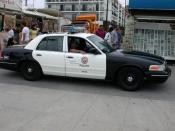Corruption within police departments falls into 2 basic categories, which are external corruption and internal corruption. In this report I will concentrate only on external corruption because it has been the larger center of attention recently. I have decided to include the fairly recent accounts of corruption from a few major cities, mainly New York. I compiled my information from numerous articles written in the New York Times over the last 15 years. My definitional information and background data came from various books cited that have been written on the issue of police corruption. Those books helped me create a basis of just what the different types of corruption and deviances are, as well as how and why corruption happens.
In simple terms, corruption in policing is usually viewed as the misuse of authority by a police officer acting officially to fulfill personal needs or wants. For a corrupt act to occur, three distinct elements of police corruption must be present simultaneously: 1) misuse of authority, 2) misuse of official capacity, and 3) misuse of personal attainment.
(Dantzker, 1995: p 157) It can be said that power inevitably tends to corrupt, and it is yet to be recognized that, while there is no reason to suppose that policemen as individuals are any less fallible than other members of society, people are often shocked and outraged when policemen are exposed violating the law.
The reason is simple. There diviance elicits a special feeling of betrayal. "Most studies support the view that corruption is endemic, if not universal, in police departments. The danger of corruption for police, and this is that it may invert the formal goals of the organization and may lead to "the use of organizational power to encourage and create crime rather than to deter it" (Sherman 1978: p...


